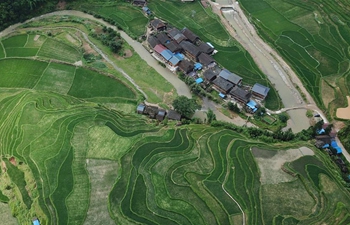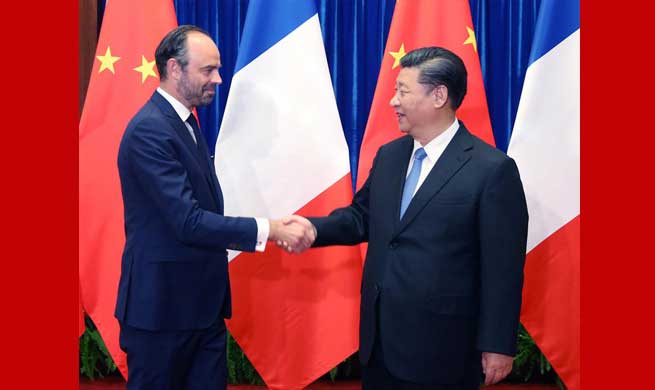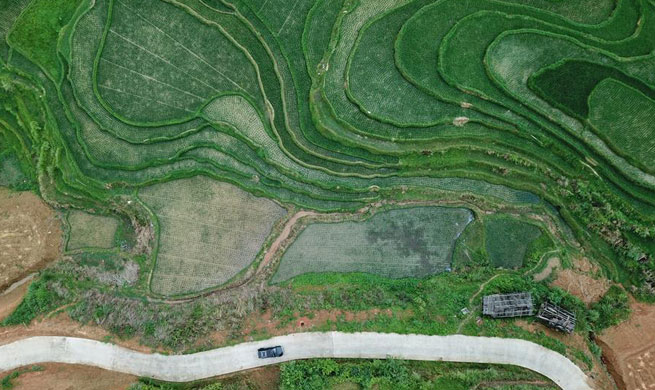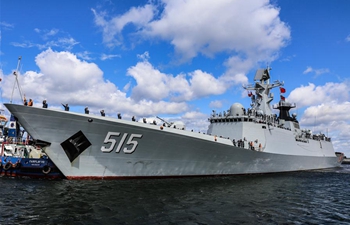by Murad Abdu
ADEN, Yemen, June 25 (Xinhua) -- After liberating several Yemeni areas located along the country's western coast, the Yemeni government forces stepped up its preparations in the Red Sea coast city of Hodeidah, ready to launch a wide-scale offensive to recapture the city's strategic port controlled by the Iranian-backed Houthis.
Despite numerous warnings of serious humanitarian consequences potentially caused by the ongoing military operations, the Yemeni government, backed by the Saudi-led Arab coalition, decided to continue its battles to expel the Houthis out of Hodeidah.
In the southern port city of Aden, Yemen's Internationally-backed President Abdu-Rabbu Mansour Hadi chaired a meeting on Sunday with Hodeidah's governor and other government officials, reaffirming that military operations will continue to liberate Hodeidah and all other areas from the grip of the Houthi militia.
A government official told Xinhua that the government strong will to liberate Hodeidah from Houthis has largely won international agreement after "hard diplomatic efforts in recent days."
"Officials representing foreign countries have understood everything about the humanitarian situation in Hodeidah and realized that ongoing military operations are the only solution to recapture the city from Houthi rebels," the official said on condition of anonymity.
"The Houthis want to continue using Hodeidah's port to receive more smuggled weapons and missiles from Iran to threaten the stability and security of Yemen and other neighboring countries," he explained.
Yemen's Minister of Human Rights Mohammed Askar told the country's Saba News Agency that the government forces place a high value on the international humanitarian law and the rules of military engagement "as they pursue their operations to rescue the Yemeni civilians from the radical Houthi militia."
He said Houthis had killed 279 civilians and injured 374 others before the government and the Saudi-led coalition launched a military campaign on June 13 to retake Hodeidah from Houthi rebels.
The Houthi rebels also arrested 862 people, forced 384 to disappearance, and tortured 58, leaving 11 of them dead, while blowing up the houses of seven oppositionists, according to the Yemeni minister.
Earlier this week, the Houthi fighters set up several fortifications and began digging up trenches in and around densely populated areas of Hodeidah, in addition to deploying snipers on rooftops to confront advancing government forces.
Residents said some of the trenches damaged underground water pipes in Hodeidah, causing flooding across the streets and disrupting the water supply in various neighborhoods.
Local military analysts and observers expect Houthis to engage in street gun battles in an apparent desperate attempt to exhaust the government forces and cause more humanitarian losses, which may be exploited by the international community to condemn the Saudi-led coalition.
The Houthis, after being pushed out of Hodeidah's airport, are now using residential neighborhoods to hide their tanks, artillery and heavy armored vehicles, in response to intensified Saudi-led air bombardment.
But Ali Naji Obeid, a strategic military expert based in Aden, said such countermeasures by Houthis, who "don't have a sense of responsibility and might commit humanitarian crimes," are unlikely to buck the advancing trend of the government forces.
"Digging trenches and blocking main roads leading to the port of Hodeidah and other areas will only affect the daily life of citizens ... but won't protect Houthi fighters," Obeid said.
"The military plans of Houthis are helpless and just created resentment and public anger among Hodeidah's residents, who will play a vital role in cooperation with government forces and accelerating the fall of Houthis," he added.
Anwar Gargash, foreign minister of the United Arab Emirates which is part of the anti-Houthi forces in Hodeidah, urged forced withdrawal of Houthi militias from the strategic port city of Hodeidah.
"At this stage, it is essential that all diplomatic effort and pressure is exerted to bring about the withdrawal of Houthi militias from the city of Hodeidah. Armed militants should not be allowed to hold a civilian population hostage," he tweeted.
Hodeidah is the single most important point of entry for the food and basic supplies to Yemen's northern provinces controlled by Houthis.
Close to 70 percent of the country's imports, including commercial and humanitarian goods, enter the impoverished Arab country through Hodeidah and Saleef, a coastal village in western Yemen.
The Yemeni government and Saudi-led coalition accuse Houthis in Hodeidah of hindering the access of humanitarian aid to the seaport and excessively delaying the delivery of humanitarian assistance to famine-hit areas.
On Sunday, the Saudi-led coalition said in a statement that the Houthi rebels are continuing a two-month block of two oil ships from entering the Hodeidah port.
Strategically situated on the Red Sea coast, Hodeidah, Yemen's fourth largest city with a population of 600,000, is the only major port city under Houthis' control.
The Hodeidah port, which Iran-backed Houthis captured in October 2014, serves as a key source of strength for Houthi militias because it is regarded as a lifeline for many Yemenis.
The United Nations warned that the battles to liberate Hodeidah, which has the highest poverty and malnutrition rates in war-torn Yemen, could lead to the death of 250,000 people.

















